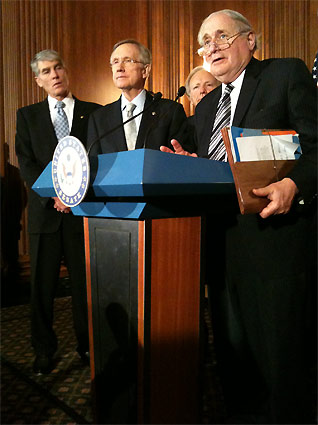Full Circle — With a Lot of Work
NEWS ANALYSIS: With the Senate vote repealing ''Don't Ask, Don't Tell,'' a shameful vote of the Congress has finally been reversed – but it took education, compromise and time
by Chris Geidner
December 19, 2010
It was not a close vote.
With 63 senators on one side and 33 senators on the other – and four not voting – the outcome was clear a little before noon Saturday, Dec. 18. Although not the final vote on the matter, which received two more affirmative votes, ”Don’t Ask, Don’t Tell” had reached its end when the Senate voted for cloture on a stand-alone bill to repeal the policy.

Sen. Carl Levin (D-Mich.) speaks to reporters after the successful cloture vote signaled the end to ”Don’t Ask, Don’t Tell” on Dec. 18, 2010. Behind him are, from left, Sens. Mark Udall (D-Colo.), Harry Reid (D-Nev.) and Joseph Lieberman (I-Conn.)
(Photo by Chris Geidner)
A little more than 17 years earlier, 63 senators also had faced off against 33 opposing senators – with four, again, not voting. Then, as today, it was not the final vote on the matter. Then, however, the vote made clear that the U.S. government would be passing a law banning openly gay, lesbian and bisexual service.
Sen. Barbara Boxer (D-Calif.) had attempted to remove DADT from the National Defense Authorization Act by replacing it with language leaving the decision about the policy ”concerning homosexuality in the Armed Forces” up to the president.
But, the measure failed. Overwhelmingly.
Less than 20 years later, though, the Senate had flipped 180 degrees on the matter.
How did it happen?
To start with, 15 of those senators opposed to the measure in 1993 stuck it out, casting a vote to repeal the law on Saturday – including Boxer. The other 48 votes for cloture – nearly half of the Senate – came from elsewhere. Seven of them – including now-Majority Leader Harry Reid (D-Nev.) – had voted against Boxer’s amendment in 1993 but voted for it today. The remainder joined the Senate since 1993.
Moving beyond the senators themselves, the complete flip of the Senate vote happened for two reasons that were, at times, contradictory and have occurred almost in spite of the other.
The successful Senate vote happened, first, because of an unmatched – and ultimately successful – public education campaign by LGBT advocacy groups and activists and supportive academics. Saying that other efforts could benefit from the lessons of the DADT repeal effort, Mara Keisling from the National Center for Transgender Equality told Metro Weekly that the bottom line was that they ”did a really good job of making it an issue.”
From the long-established entities like Servicemembers Legal Defense Network and the Palm Center to newer groups like Servicemembers United and even Out Serve, no reporter (or senator) was ever without an informed voice – often a former or even current servicemember – willing to explain the precise impact of the discriminatory policy.
On the same day in March of this year, former Air Force Major Mike Almy, an SLDN client, was testifying before the Senate Armed Services Committee as former Army Lt. Dan Choi was, with Get Equal, raising the stakes for the White House in a way no one had yet done to the administration.
That awareness-raising effort — including the unprecedented netroots efforts to push the issue and the shove provided by the Log Cabin Republicans’ lawsuit this fall — was essential to keeping DADT repeal on the front burner at the White House, in Congress and in the media. The education brought public opinion around, and it allowed an open discussion based on facts – and not fears.
That, though, was only half of the battle.
The other half was less pretty – and much less thankful. The end of the military’s discriminatory policy against gay, lesbian and bisexual servicemembers also is happening because of a smart, determined political strategy by the White House, Senate Armed Services Committee chairman Carl Levin (D-Mich.), Sen. Joseph Lieberman (I-Conn.), Rep. Patrick Murphy (D-Pa.) and the ”insider” LGBT organizations that have received the ire from many at the forefront of the first necessary part of the strategy that reached its success on Dec. 18.
With the support of Reid and Speaker Nancy Pelosi (D-Calif.), the strategy of attaching repeal to the National Defense Authorization Act was the only way forward in the spring and summer. Moreover, repeal would not have even gotten off the ground had members of Congress not believed that the president – and the leadership at the Pentagon – was behind the effort.
To that end, Jan. 27 – the date that Obama said in the State of the Union address that he would ”work with Congress and our military to finally repeal the [DADT] law” – and Feb. 2 – the date that Defense Secretary Robert Gates and Adm. Mike Mullen, the chairman of the Joint Chiefs of Staff, told the Senate that they supported repeal – were the keys to all that followed in Congress.
But, as Winnie Stachelberg, a longtime LGBT advocate who is the senior vice president at the Center for American Progress, said in the moments after the cloture vote, ”Undoing a law is always a difficult prospect and procedure.” Part of that difficulty, as was seen in recent weeks, is because the specific concerns of every lawmaker whose vote was needed had to be answered.
Stachelberg, who has been a part of most of the White House meetings with pro-repeal organizations throughout the year, has been criticized – along with the Human Rights Campaign and its president, Joe Solmonese – by some activists, and even some other groups, as being too cozy with the administration. Stachelberg and CAP faced fire for their role in crafting the language in the repeal bill that requires the president, Defense secretary and chairman of the Joint Chiefs of Staff to certify that the changes needed to implement repeal are ”consistent with the standards of military readiness, military effectiveness, unit cohesion, and recruiting and retention of the Armed Forces.”
That certification language, the formation of the Pentagon working group and the resulting working group report released Nov. 30, though, were some of the very same ”insider” compromises that allowed the bill to move forward in May and brought along many of the moderate votes for cloture on the stand-alone repeal bill on Dec. 18. Without the flexibility of the certification language, judging by the testimony of Sen. Jim Webb (D-Va.) on the floor of the Senate in the debate hours before the vote, his vote – which was against repeal in May – likely would have remained in opposition.
But Webb didn’t, instead voting for cloture and, later on Dec. 18, for final passage of DADT repeal. He was joined in the final vote by all of the other Democrats voting – Sen. Joe Manchin (D-W.V.) did not vote at all – and eight Republicans.
As Rachel Maddow – who has been critical of Obama on this issue – said on MSNBC after the vote, ”This is the president’s victory. … This is a difficult promise kept.”
It was, however, a promise kept that took education, that took compromise and that took time from all sides. It took the outsiders and the insiders; it took the activists and the strategists. It took the passion for equality that 33 senators – led by Barbara Boxer – expressed in 1993.
Only then, on Dec. 18, was it possible for the Senate to take the wisdom of all of those voices to invert the 1993 vote and signal the end to ”Don’t Ask, Don’t Tell.”
David Mixner: Politically Speaking – The Metro Weekly Interview
To say that David Mixner has opinions on just about everything is an understatement. We get to know the legendary gay politico.
By Randy Shulman on March 12, 2024 @RandyShulman
Editor's Note: This in-depth interview with David Mixner, who passed away on Monday, March 11, 2024, at the age of 77, originally appeared in the issue of July 29, 2004. Photography by Todd Franson.
"You want a soundbite?"
David Mixner grins.
"I'll give you a soundbite. I'm a man who's devoted forty years of his life -- sometimes at great validation and sometimes at great pain -- to the struggle for freedom and human rights.
"You know, when I was a child growing up," he continues, "we didn't have television, but we got Life magazine. And it opened the outside world to us. As a kid I said, 'I want to live the history of my times. I want to witness it.' And then I got to a second level where I said, 'God, if I could just meet and shake the hands of the people making the history of my times, I'd be happy.' And then I said to myself, 'If I could just be a tiny footnote in the history of my times.'
Support Metro Weekly’s Journalism
These are challenging times for news organizations. And yet it’s crucial we stay active and provide vital resources and information to both our local readers and the world. So won’t you please take a moment and consider supporting Metro Weekly with a membership? For as little as $5 a month, you can help ensure Metro Weekly magazine and MetroWeekly.com remain free, viable resources as we provide the best, most diverse, culturally-resonant LGBTQ coverage in both the D.C. region and around the world. Memberships come with exclusive perks and discounts, your own personal digital delivery of each week’s magazine (and an archive), access to our Member's Lounge when it launches this fall, and exclusive members-only items like Metro Weekly Membership Mugs and Tote Bags! Check out all our membership levels here and please join us today!
The Magazine
-
Most Popular
 George Santos, Duped by NAMBLA Prank, Exits Race for Congress
George Santos, Duped by NAMBLA Prank, Exits Race for Congress  Trolls Hate on No. 1 NFL Draft Pick for Pink Phone and Nail Polish
Trolls Hate on No. 1 NFL Draft Pick for Pink Phone and Nail Polish  'Challengers' is a Sexy, Ripping Love Match (Review)
'Challengers' is a Sexy, Ripping Love Match (Review)  'The Human Museum' Puts the Bots in Charge (Review)
'The Human Museum' Puts the Bots in Charge (Review)  For Don Mancini, Chucky is So Much More Than a Killer Toy
For Don Mancini, Chucky is So Much More Than a Killer Toy  GLOW's Secret Garden Is An "Escape...With A Chill Vibe"
GLOW's Secret Garden Is An "Escape...With A Chill Vibe"  California Mayor Recalled After Coming Out as Transgender
California Mayor Recalled After Coming Out as Transgender  The Awesome Power of Katy O'Brian
The Awesome Power of Katy O'Brian  'Unknown Soldier' Makes for a Soaring Romance (Review)
'Unknown Soldier' Makes for a Soaring Romance (Review)  Town 2.0 Sues to Terminate Lease for St. Phillip's Church
Town 2.0 Sues to Terminate Lease for St. Phillip's Church
 'Challengers' is a Sexy, Ripping Love Match (Review)
'Challengers' is a Sexy, Ripping Love Match (Review)  'The Human Museum' Puts the Bots in Charge (Review)
'The Human Museum' Puts the Bots in Charge (Review)  George Santos, Duped by NAMBLA Prank, Exits Race for Congress
George Santos, Duped by NAMBLA Prank, Exits Race for Congress  Grindr is Being Sued for Sharing HIV Statuses
Grindr is Being Sued for Sharing HIV Statuses  Judge Blocks Ohio's Anti-Transgender Bans
Judge Blocks Ohio's Anti-Transgender Bans  D.C. Courts Pop-Up Businesses Ahead of WorldPride
D.C. Courts Pop-Up Businesses Ahead of WorldPride  Cher to be Inducted in the Rock & Roll Hall of Fame
Cher to be Inducted in the Rock & Roll Hall of Fame  Texas Governor Wants to Ban Trans People from Being Teachers
Texas Governor Wants to Ban Trans People from Being Teachers  For Don Mancini, Chucky is So Much More Than a Killer Toy
For Don Mancini, Chucky is So Much More Than a Killer Toy  LGBTQ Teen Sues School Over Suspension For Rap Lyrics
LGBTQ Teen Sues School Over Suspension For Rap Lyrics
Scene
Metro Weekly
Washington's LGBTQ Magazine
P.O. Box 11559
Washington, DC 20008 (202) 638-6830
About Us pageFollow Us:
· Facebook
· Twitter
· Flipboard
· YouTube
· Instagram
· RSS News | RSS SceneArchives
- "We use cookies and other data collection technologies to provide the best experience for our customers. You may request that your data not be shared with third parties here: "Do Not Sell My Data
Copyright ©2024 Jansi LLC.








